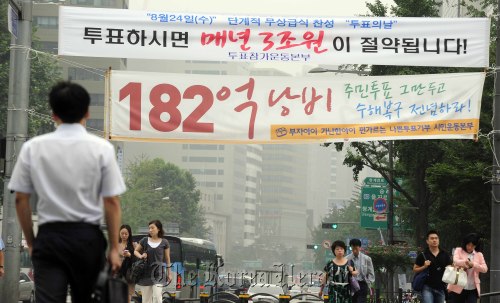President backs Seoul mayor in opposition to free school meal plan
A Seoul court on Tuesday dismissed a request to suspend a plebiscite next week on free school lunches, clearing the way for the city to hold the vote as scheduled.
The Seoul Administrative Court rejected the appeal made by the city’s opposition-dominated council and liberal civic groups.
 |
Two banners showing opposite views on the upcoming plebiscite on free school meals hang over a street in Jongno, Seoul, on Tuesday. One urges citizens to participate in the vote, while the other calls it a waste of tax payers’ money. (Park Hae-mook/The Korea Herald) |
A member of the city council Lee Sang-soo and others claimed in the file that a local court is reviewing the legitimacy of 450,000 people’s autographs asking for the vote since many of them are suspected to be false or have been collected twice. A separate court is also looking into whether Seoul Mayor Oh Se-hoon’s refusal to execute the free meal program could be malfeasance.
However, Judge Ha Jong-dae said: “The ruling of the court will not affect the voting result. Also, the collection of signings and request procedure for the voting might have been off the beat but are not illegitimate.”
The Seoul city government is set to hold the vote on Aug. 24, asking residents whether they approve of the opposition party-led plan to provide all students with free lunches.
Oh vowed a victory. “I respect the court’s order. We hope the opponents would never provoke another dispute,” he said after the ruling.
The main opposition Democratic Party decried the decision. “The court’s ruling was more than an embarrassment,” said Rep. Lee Yong-sup, spokesman of the DP. “We will veto the voting in order to secure people’s rights and responsibility to be given free meals.”
Meanwhile, a presidential aide said that President Lee Myung-bak supports Oh in opposition to the controversial plan to give out free school meals to children of all income brackets.
Oh currently insists on providing the benefit to students from low income families, resisting liberal educational superintendent Kwak No-hyun’s universal scheme.
Park Heong-joon, special advisor to the President on social affairs, said at a local radio show that Lee was concerned about the way the paradigm of welfare is perceived in society.
“The President shares a basic understanding with Oh,” he said. “This voting is not about whether to give out free meals to all students or not, but a competition over how to perceive and frame the welfare paradigm,” he added.
Park said the president does not intend to shrink the welfare budget but will not expand the benefits to those who do not need it. “The welfare budget will continue to grow and the most important thing is good management of it,” he said.
Park’s remarks came a day after the president said the government should stand against populists using welfare as a bandwagon tool in the Liberation Day address.
“In some countries, competitive welfare populism by lawmakers brought about national bankruptcy. We have to avoid repeating the same mistakes,” Lee said.
“If the state budget is depleted, it would be impossible to continue implementing welfare policies. In addition, we should not make the error of giving financial aid to those who are well off, thus preventing such assistance flowing into the hands of those in desperate need. We have to remain vigilant so that policies formulated for present convenience do not become an unmanageable burden for future generations.”
By Bae Ji-sook (
baejisook@heraldcorp.com)








![[Today’s K-pop] Blackpink’s Jennie, Lisa invited to Coachella as solo acts](http://res.heraldm.com/phpwas/restmb_idxmake.php?idx=644&simg=/content/image/2024/11/21/20241121050099_0.jpg)